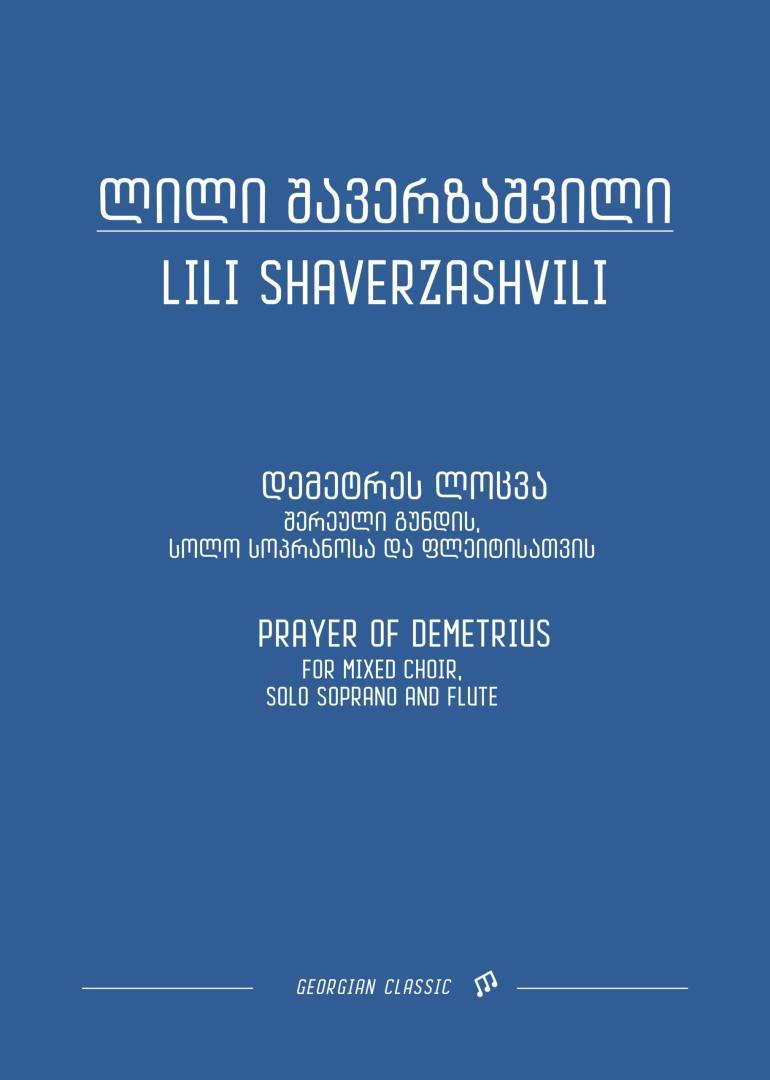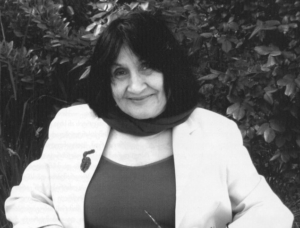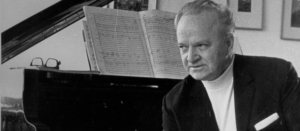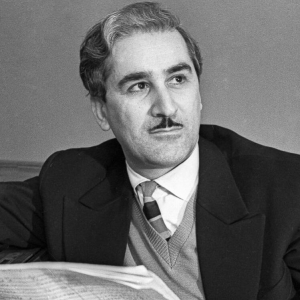Lili
Shaverzashvili
Lili Shaverzashvili
(1940-2018)
Lili (Elisabed) Shaverzashvili – Georgian Composer, Teacher. Member of the Union of Composers of the Soviet Union.
He has created: vocal–symphonic cycle for mezzo–soprano and symphony orchestra (in four parts, on the text of Vazha–Pshavela), vocal–instrumental work “Dialogue” for voice, flute and piano (on folk text), violin sonata, Allegro for orchestra, romances, songs , instrumental pieces, vocal cycle “Song of the Mountains” and “Music for Orchestra”…
Date of birth – October 28, 1940
Place of birth – Tbilisi, Georgia
Date of death – March 20, 2018
Place of death – Tbilisi, Georgia
She is buried in Didube Mukhatgadi Cemetery – Tbilisi
BIOGRAPHICAL DATA
1964 – Graduated from the Tbilisi State Conservatory named after Vano Sarajishvili, majoring in composition (teachers: first Iona Tuskia, then Davit Toradze);
1965 – 1967 – Music editor of Georgian Radio;
Since 1967 – Teacher at Tbilisi II Music School;
AWARDS AND RECOGNITION
1966 – Member of the Union of Composers of the Soviet Union
LILI SHAVERZASHVILI
(1940-2018)
SELECTED WORKS
ORCHESTRAL MUSIC
1962 – “Allegro” – for Symphonic Orchestra
1976 – Music for Symphonic Orchestra
1977 – “Soviet Georgia” – for Symphonic Orchestra
CHAMBER-INSTRUMENTAL MUSIC
1962 – Sonata for Violin and Piano
1971 – 5 Pieces for Piano
1975 – 4 Polyphonic Pieces for Piano
VOCAL-INSTRUMENTAL MUSIC
1964 – Vocal-Symphonic Cycle for Mezzo-Soprano and Symphonic Orchestra – (text – V. Pshavela)
1972 – “Song of the Mountains” – Vocal Cycle for Mezzo-Soprano and Piano – (text – folk)
1972 – “Dialogue” – Vocal-Instrumental Triptych for Voice, Flute and Piano – (text – folk)
1961 – “Evening at the Tbilisi Sea” – Romance for Voice and Piano – (text – G. Abashidze)
1968 – “Prayer of Avtandil” – Monologue for Mezzo-Soprano and Piano – (text – Sh. Rustaveli)
1972 – “Prayer of Demeter” – Monologue for Solo Soprano, Mixed Choir and Flute, Mezzo-Soprano and Piano – (text – L. Chantladze)
1977 – “Mikhail Khergiani” – Vocal Cycle for Mixed Choir a Cappella – (text – V. Gogolashvili)
1977 – “Seasons of the Year” – Vocal Cycle for Mixed Choir a Cappella – (text – V. Lebedeva)
1969 – 5 songs for Children
1974 – “Songs for children” – On The Poems of Georgian poets
1975 – 8 Songs For Children – (text – V. Lebedeva, V. Tatarinov)
Lili Shaverzashvili
(1940-2018)
Lili Shaverzashvili is a notable member of the Shaverzashvili musical dynasty. Her father, Vasil Shaverzashvili, was a founder of Georgian pop music; her aunt, Tamar Shaverzashvili, was a pioneer of Georgian children’s music; and her brother, composer and public figure Alexander Shaverzashvili – whose descendants are carrying on the family tradition.
Lili Shaverzashvili’s early compositions date from the 1960s: allegro for orchestra (1962), sonata for violin and F-no (1962), vocal-symphonic cycle for mezzo-soprano, accompanied by a symphony orchestra, on the lyric of Vazha-Pshavela (1969), piece for a cappella choir “Tea Pickers” (1969). (1967).
Since the 1970s, the name Lili Shaverzashvili has emerged in publications representing Tbilisi’s concert life. It captivates the interest of more than just Georgian musicologists. Her vocal cycles “Dialogue” (1971) and “Mountain Songs” (1972) are particularly noteworthy. Both vocal cycles are based on folk poetry samples.
With regard to this, we must consider the processes that occurred in Georgian professional music in the 1960s and 1970s, which led to the formation of a new way of thinking and outlook. During this time, works were created that transformed the way people viewed events and expressed themselves. The following notable works should be listed in this case: The vocal cycle by Sulkhan Nasidze from “Georgian folk poetry” (1969), notable for its: philosophical viewpoint on life based on centuries-old Georgian folk poetry; compositional methods drawn from the depths of Georgian folk music without direct quotation of the source material; Also included Joseph Kechakmadze’s a cappella choral cycles, “Pshavuri Idylls,” based on Ana Kalandadze’s text (1972), and “Old Tbilisi Pictures,” with a modern, fresh understanding of Georgian polyphony, based on Yetim Gurji, Giorgi Skandarnova, and folk poems (1976), by opening up a new realm of intonation. The cited works marked a turning point and opened new vistas in Georgian compositional theory.
Lili Shaverzashvili followed the ideas that carried Georgian professional music to its zenith. While attempting to offer her personal interpretation of the events, it is important to note that the composer uses a variety of intriguing expressive techniques and a profound mastery of dramaturgical principles to get her idea forward.
“Dialogues” and “Mountain Songs,” two vocal cycles by Lili Shaverzashvili, attract interest for the stability of the form and the fusion of regional and classical polyphonic components. Elisabeth Balanchivadze, a musicologist, notes the distinctive qualities of each cycle: “Dialogues” represent the ongoing logic of dramaturgy growth, as “Mountain Songs” are opposed sketches with evident stylistic parallels. The composer combines a folk poetics-specific element like imitating detailing and depth of generalization in both cycles. The internal dialogicity of monologic expressions in “Mountain songs” — where vocal instrumentalization conflicts with the vocalization of the instrumental beginning.
Since the 1970s, Lili Shaverzashvili’s interests have become increasingly centered on choral and a cappella music. She wrote the a cappella choral composition “Who calls me” in 1975, based on a text by Moris Potskhishvili, and two a cappella choral cycles, “Mikheil Khergiani” and “Seasons of the Year,” based on texts by Vakhtang Gogolashvili and Lebedev in 1977.
From this point on, the cycle “Mikhail Khergiani” caught people’s attention in particular because it became clear that the author had a firm grasp of the new national polyphonic tone, which involves the fusion of modern technical methods and folk origins. Against this background, she also made clear her own conceptual vision.
Remarkable pieces were provided by Lili Shaverzashvili to the Georgian Piano Music Foundation. Her compositions are distinguished by detailed review of a wide spectrum of pianistic art, and here is another place where the organic and careful mixing of local materials with classical, European standards are evident. This refers to her five piano compositions from 1971, including her four piano works with polyphony (1975).
The first performer of her piano compositions was pianist Eter Gulisashvili, who had Lily Shaverzashvili’s works in her concert repertoire for years. Among these is the piano composition “Tango-Caprice,” which has always evoked a positive reaction due to its temperamental, passionate character and the awakening of powerful pianistic resources.
The piano waltz “Romantic” by Lily Shaverzashvili is dedicated to Eter Gulisashvili. This work is notable for reflecting the waltz genre with a new take, underlining the author’s attitude toward discovering the romantic tendency and appreciating the meaning of the waltz in a new reality.
“I suppose and hope that not just only few pianists would like to have this composition in their concert program,” said musicologist Rusudan Kutateladze about Lili Shaverzashvili’s “Tango-Caprice.”
Lili Shaverzashvili’s pop songs, such as “Violet and Poppy,” “Morning Song,” “Expectation,” and others, are also impressive.
Consideration, attention, research, and acknowledgment should be given to Lili Shaverzashvili’s artistic heritage because she made an impact on Georgian professional music.
Musicologist
Tamar Tsulukidze
English Language Translator
Tamar Kharadze





















